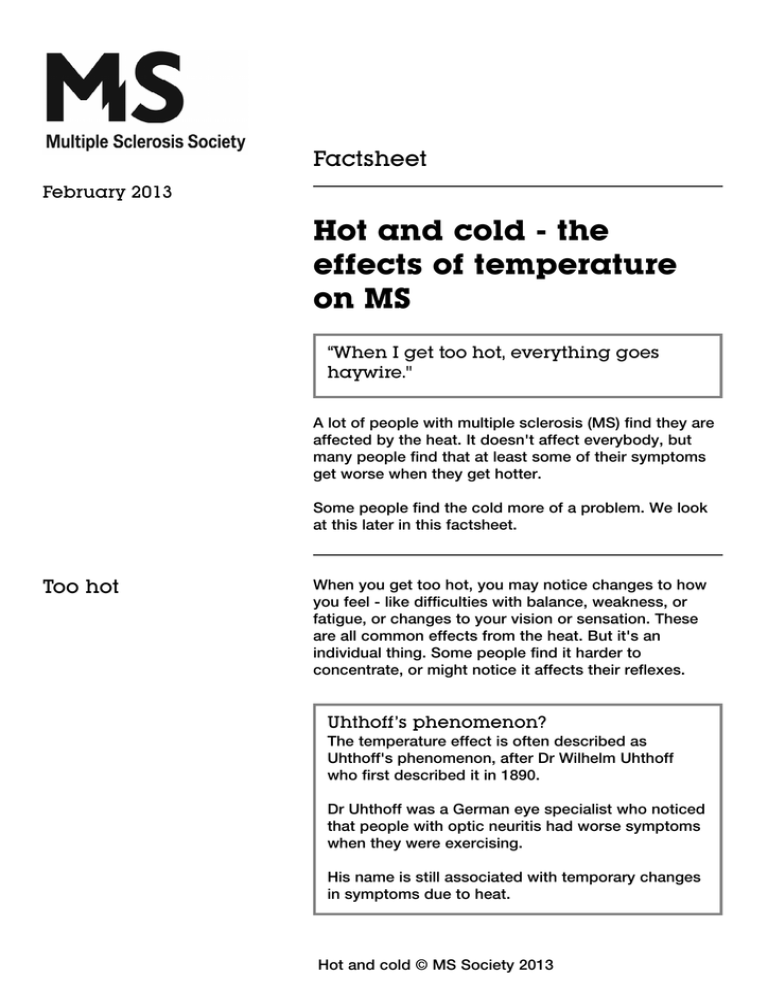Hot and cold - the effects of temperature on MS
advertisement

Factsheet February 2013 Hot and cold - the effects of temperature on MS “When I get too hot, everything goes haywire." A lot of people with multiple sclerosis (MS) find they are affected by the heat. It doesn't affect everybody, but many people find that at least some of their symptoms get worse when they get hotter. Some people find the cold more of a problem. We look at this later in this factsheet. Too hot When you get too hot, you may notice changes to how you feel - like difficulties with balance, weakness, or fatigue, or changes to your vision or sensation. These are all common effects from the heat. But it's an individual thing. Some people find it harder to concentrate, or might notice it affects their reflexes. Uhthoff’s phenomenon? The temperature effect is often described as Uhthoff's phenomenon, after Dr Wilhelm Uhthoff who first described it in 1890. Dr Uhthoff was a German eye specialist who noticed that people with optic neuritis had worse symptoms when they were exercising. His name is still associated with temporary changes in symptoms due to heat. Hot and cold © MS Society 2013 Are there long-term effects? No long-term harm is thought to come from body warming. Symptoms usually return to their existing levels as your body cools down. Some people notice that they feel more fatigued than usual for several hours, or even a few days after over-heating, but recovery can be much quicker. However, it's important to check that there is not another reason for any increase in symptoms, such as an infection or a thyroid condition. These might benefit from treatment. Speak to your GP or MS nurse if you are concerned. Not just the weather Heat or exercise-related symptoms might be brought on by activity, sunbathing, hot baths, strong emotions, exercise, fever or other things associated with an increase in body temperature. Many people with MS do find hot weather difficult, but, even in cooler weather, taking a hot shower or even using a hair dryer can sometimes be a problem. For women with MS, the menstrual cycle might cause changes in body temperature, as can the menopause. Exercise Exercise is important for general health. If the heat affects you, you might want to adjust the exercise you choose, or try different ways of cooling down before, during and afterwards. But it needn't be a reason to avoid exercising completely. Your GP, MS nurse, physiotherapist or occupational therapist might all be able to advise on staying cool and exercising. For more about exercise that's right for you, see our booklet Exercise and physiotherapy and our DVD introduced by Sally Gunnell, Exercising with MS. 2 Hot and cold © MS Society 2013 How hot is too hot? A 'normal' temperature is around 37 degrees Celcius. It varies slightly from person to person. If the heat does affect you, it might take only a small shift from your 'baseline' body temperature to notice an effect on your symptoms. Studies have shown that a rise in body temperature of only half a degree Celsius can affect how people feel. Some people use a thermometer to see if they are getting too warm, but many find the most practical approach is to listen to their body and find ways to cool down if they feel overheated. See 'Keeping cool' on page 4. Why do raised temperatures have such an effect? It seems that raised temperatures stop nerve fibres from working properly - if the fibres or their protective outer layer (myelin) have already been damaged by MS. In the brain and spinal cord, messages pass along nerve fibres to control all the different parts of the body. These messages are passed as electrical impulses. Fig. 1 cell body In an undamaged nerve (Fig.1), messages pass smoothly along the nerve fibre. nerve fibre (axon) myelin passage of messages along the axon Fig. 2 When things get too warm, messages find it even harder to pass along the nerve. So in a nerve where messages were already going slowly, they might not get through at all. This makes symptoms worse, until the nerve fibres cool down again. 3 cell body A nerve damaged by MS (Fig. 2) finds it harder to conduct these electrical impulses. Depending on how bad the damage is, messages might still get through, but they could be slower or distorted. damaged myelin (demyelination) distorted messages Hot and cold © MS Society 2013 Keeping cool Just a few ideas for keeping cool - you might find your own that work better for you. You might find others that people have found helpful in our online forum: www.mssociety.org.uk/forum Simple and cheap: drinking cold liquids sucking ice cubes taking cool baths (start with warm or tepid water and increase the coldness to avoid a shockingly cold experience) opening a window or sitting in front of a fan Some people use body-cooling garments, often in the form of 'cooling vests', though other options include cooling ties. Cooling garments can be passive or active. Passive garments, such as cooling ties, use evaporation or ice packs for cooling. Active garments use circulating coolants, rather like a fridge. They need a power source to work. You might not use a cooling garment all the time. For example, if you find that heat is a problem when you eat, you might just try using one at mealtimes. Before buying anything, you might want to talk to your MS nurse. And perhaps try out several garments before deciding. MS sometimes changes the way a person experiences hot and cold on the skin. So it's important that, for example, ice packs are not left directly on the skin. The Living Made Easy website has information about different cooling clothes and devices: www.livingmadeeasy.org.uk or call 0845 130 9177. 4 Hot and cold © MS Society 2013 On holiday - or when it's really warm at home - there are several things you can try to keep cool: avoid hot environments like kitchens or very sunny rooms avoid long car trips unless you have effective air conditioning wear light-coloured, loose-fitting clothing keep your head covered if you're in the sun avoid direct sunlight (sit in the shade) keep curtains or blinds closed in the day to stop the heat building up search out air-conditioned hotels, cafes and restaurants increase your fluid intake (try cold drinks) keep a hand-held mini-fan close by moisten clothing using a water spray dip sports sweat bands in cold water and put them on both wrists use cooling garments try clothing with 'wicking' properties which draw moisture away from the skin and, through evaporation, can help to keep your temperature stable Too cold It's less common than feeling the heat, but some people do find the cold is a problem. If you are affected in this way, you might notice sensory symptoms or mobility issues get worse when you're cold. Even some people usually more affected by the heat might notice that their muscles feel stiffer in the cold. Low temperatures might bring on spasms, or a feeling of tightness in the muscles. As with heat, these changes are usually temporary - if you can find a comfortable temperature, these effects should fade away. 5 Hot and cold © MS Society 2013 There has not been a great deal of research into the effects of cold on MS symptoms, and we don't know for certain why it happens. But whatever the reasons behind it, for some people, keeping warm feels more vital than keeping cool. Keeping warm Our bodies can generate heat from moving around, so it can be harder to stay warm if your mobility is affected. Of course, warm clothes can help, as might heat pads and hand warmers. But MS sometimes changes the way a person experiences hot and cold on the skin. So it's important that, for example, a heat pad or hot water bottle is not too hot and is not left directly on the skin. This can cause blisters. Some people also find that tight clothes feel painful, and might trigger muscle spasms. So tight-fitting thermal wear, for example, might not be helpful. Layering looser clothes might be a better solution. We can lose heat from anywhere on our body, so hats, thick socks and lined boots are all good for warmth. Frequent hot meals and hot drinks can help warm the body. Storing a hot drink in a flask can help avoid repeated trips to the kettle. You might also be able to claim financial and practical help with heating and insulating your home. For information about schemes where you live, contact the Energy Saving Trust - www.energysavingtrust.org.uk or 0300 512 012. The Living Made Easy website has information on dressing for warmth: www.livingmadeeasy.org.uk or call 0845 130 9177. 6 Hot and cold © MS Society 2013 Useful resources Multiple Sclerosis: 300 Tips for making life easier (Second Edition) (2006) by Shelley Peterman Schwartz. Published by Demos. Multiple Sclerosis: the Questions you have the answers you need (Third Edition) (2005) by Rosalind C. Kalb. Published by Class Publishing. References A list of references is available on request, and all cited articles are available to borrow from the MS Society library (there may be a small charge). Contact the UK Information Team, or visit www.mssociety.org.uk/library Further copies of this factsheet or other MS Society information Download from www.mssociety.org.uk If you don't have access to a printer and would like a printed version of this factsheet, or any other MS Society publication or DVD, call the Information Team on 020 8438 0799 (weekdays, 9am-4pm) or email infoteam@mssociety.org.uk MS Helpline The MS Helpline offers confidential emotional support and information to anyone affected by MS, including family, friends, carers, newly diagnosed or those who have lived with the condition for many years. Calls can be made in over 150 different languages, via an interpreter. Call freephone 0808 800 8000 (weekdays 9am-9pm, except bank holidays) or email helpline@mssociety.org.uk Can you spare five minutes to help us to improve our information? If so, go to mssociety.org.uk/publications and click on ‘Take the survey’ 7 Hot and cold © MS Society 2013 Authors and contributors Disclaimer: We have made every effort to ensure that the information in this publication is correct. We do not accept liability for any errors or omissions. The law and government regulations may change. Be sure to seek local advice from the sources listed. Suggestions for improvement in future editions are welcomed. Please send them to infoteam@mssociety.org.uk Written by Sarah Westlake Edited by James Bailey With thanks to MS specialist nurses Liz Wilkinson, Carol Turner and all the people affected by MS who contributed to this publication. © Multiple Sclerosis Society 2013 First edition, May 2008 Second edition, February 2013 This title will be reviewed within three years. Multiple Sclerosis Society. Registered charity nos. 1139257 / SC041990. Registered as a limited company in England and Wales 07451571. FS10/0213 8 Hot and cold © MS Society 2013

